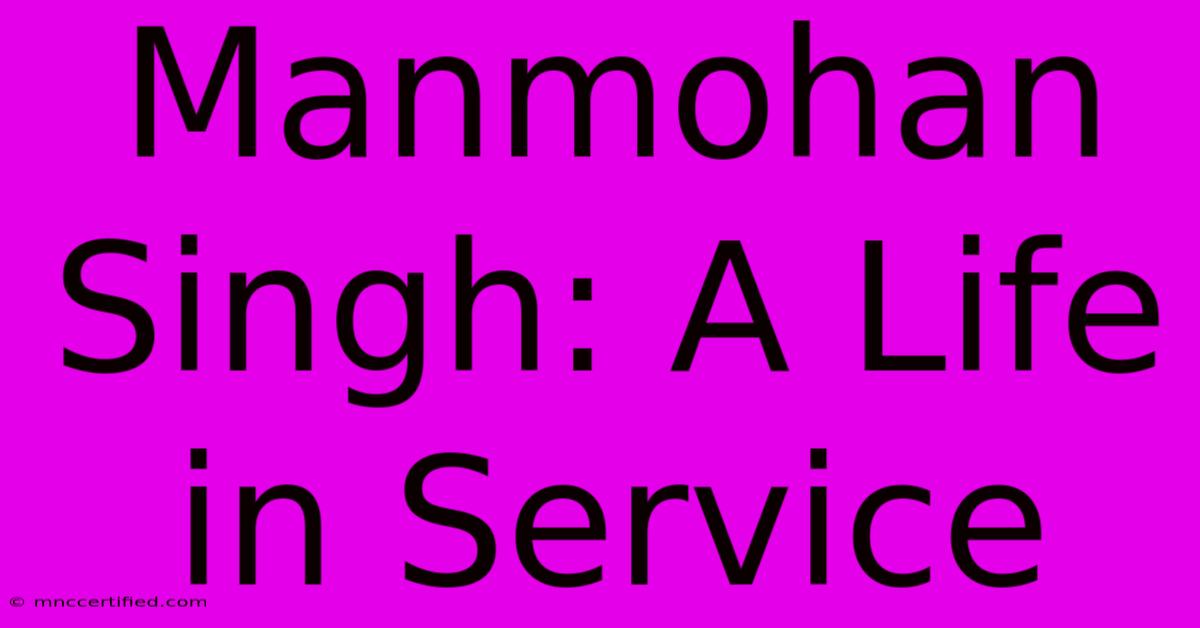Manmohan Singh: A Life In Service

Table of Contents
Manmohan Singh: A Life in Service
Dr. Manmohan Singh's life is a testament to quiet leadership, economic reform, and unwavering dedication to public service. This article delves into the key aspects of his remarkable journey, from his humble beginnings to his significant contributions as the Prime Minister of India. We'll explore his pivotal role in India's economic liberalization and examine his legacy as a statesman.
Early Life and Academic Achievements
Born in 1932 in Gah, Punjab, Manmohan Singh's early life was marked by hardship and resilience. His academic brilliance shone through, earning him a scholarship to Cambridge University, where he obtained a PhD in economics. His academic prowess laid the foundation for a career deeply intertwined with shaping India's economic destiny. This early dedication to education is a significant factor in understanding his later success and meticulous approach to policy-making.
A Rising Star in Economics
Upon returning to India, Singh quickly established himself as a leading economist. His expertise in economic planning and development caught the attention of the government, propelling him into key advisory roles. His deep understanding of global economics and his commitment to fiscal discipline would become hallmarks of his later career. This period solidified his reputation as a brilliant mind capable of navigating complex economic challenges.
The Architect of Economic Liberalization
The 1991 economic crisis presented India with a critical juncture. It was during this time that Dr. Singh, as Finance Minister under Prime Minister P.V. Narasimha Rao, spearheaded the landmark economic reforms that would transform India's economic landscape. These reforms, often referred to as economic liberalization, included:
- Deregulation: Reducing government control over industries and allowing for greater private sector participation.
- Privatization: Opening up state-owned enterprises to private investment.
- Globalization: Integrating the Indian economy into the global marketplace through trade liberalization.
These bold moves, though initially met with resistance, ultimately laid the groundwork for India's remarkable economic growth in subsequent decades. Singh's role in this transformation is indelible, earning him the title of the "Father of Indian Economic Reforms". The impact of these reforms is still felt today, making this period a cornerstone of his legacy.
Navigating Challenges and Criticisms
The liberalization process wasn't without its challenges. Critics pointed to increased income inequality and the negative impacts on certain sectors. However, Singh's supporters argue that the long-term benefits of economic growth outweighed the short-term costs. Understanding these criticisms and Singh's responses is vital for a complete picture of his economic policies. This period showcases his ability to make difficult decisions in the face of significant opposition, a characteristic of strong leadership.
Prime Minister of India: A Period of Stability
From 2004 to 2014, Manmohan Singh served as the Prime Minister of India, leading the United Progressive Alliance (UPA) government. His tenure was characterized by a focus on inclusive growth, aiming to distribute the benefits of economic progress more equitably. While his government achieved notable successes in poverty reduction and infrastructure development, it also faced criticism regarding corruption and slow decision-making.
A Legacy of Service
Dr. Manmohan Singh’s political career, though sometimes marked by controversy, underscores a commitment to pragmatic governance and a deep understanding of economic principles. His legacy extends far beyond policy decisions; it encompasses a quiet dignity and a dedication to serving the nation. This dedication to public service, irrespective of political pressures, is a crucial aspect of his enduring impact.
Conclusion: A Lasting Influence
Manmohan Singh's life is a study in perseverance, intellectual rigor, and unwavering dedication to the betterment of India. From his academic achievements to his pivotal role in economic liberalization and his tenure as Prime Minister, his contributions have indelibly shaped India's trajectory. His legacy continues to inspire debate and discussion, solidifying his position as one of India's most influential figures of the modern era. Analyzing his life and career provides valuable insights into economic development, political leadership, and the complexities of nation-building. His story serves as a reminder of the power of quiet leadership and the lasting impact a single individual can have on a nation's destiny.
Keywords: Manmohan Singh, Indian Economy, Economic Liberalization, Prime Minister of India, Indian Politics, Economic Reforms, Finance Minister, Inclusive Growth, Cambridge University, Poverty Reduction, Globalization, Deregulation, Privatization.

Thank you for visiting our website wich cover about Manmohan Singh: A Life In Service. We hope the information provided has been useful to you. Feel free to contact us if you have any questions or need further assistance. See you next time and dont miss to bookmark.
Featured Posts
-
Nosferatu Deleted Ending Revealed
Dec 27, 2024
-
Heats Butler Trade Riley Says No
Dec 27, 2024
-
Haaland Penalty Failure City Draw At Everton
Dec 27, 2024
-
Manmohan Singh Indias Former Pm Passes
Dec 27, 2024
-
Flight Tests Chinas Advanced Stealth Fighter Prototype
Dec 27, 2024